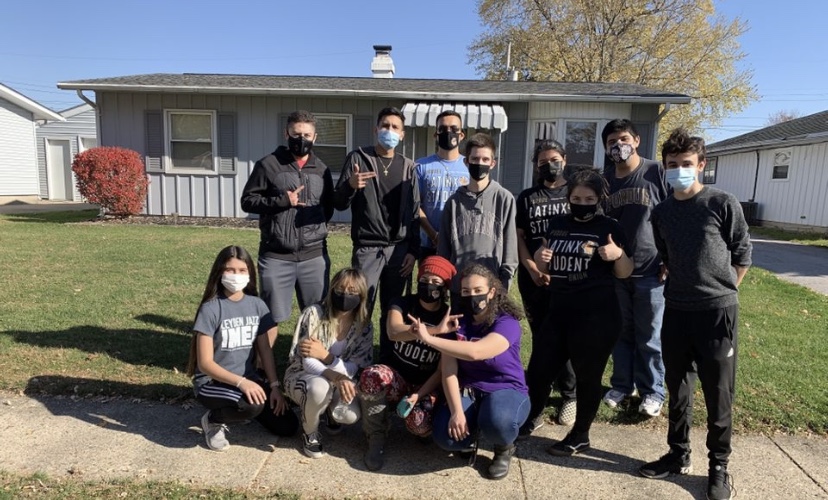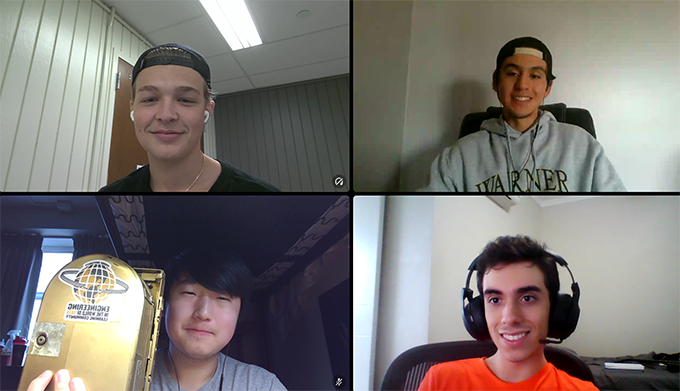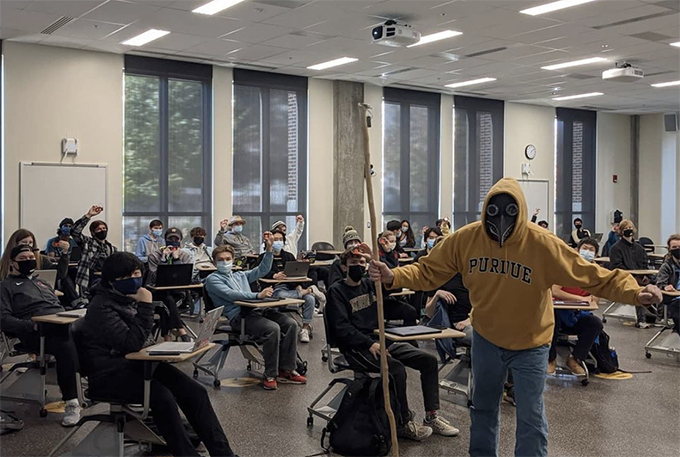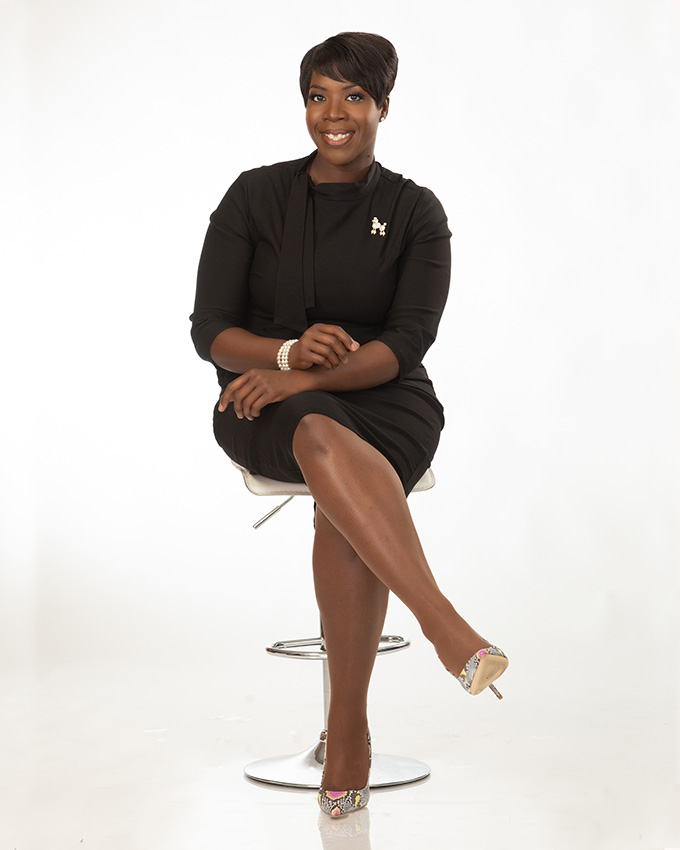
November 2020

Student Profile
First-Year Student Finds Connections in Learning Community
Like many incoming first-year students, Dannalee Mata was wondering how she would make friends and fit in at Purdue. During the application process, Mata discovered learning communities and was immediately interested in whether joining one could help in her transition to university life. After doing some research and considering the options available, she decided to enroll in the Women in Technology Learning Community, housed in newly-opened Meredith South Residence Hall.
“I’m an out of state student and I didn’t know anyone else that was coming to Purdue,” says Mata. “I really wanted a way to find a community and make friends right away. I felt like this was the perfect first step because, since we all have similar majors, we’re not just neighbors – we’re classmates, and from there we could become friends.”
The Women in Technology Learning Community is designed for students enrolled in Purdue Polytechnic programs. In addition to sharing living space in Meredith South, Mata and the other members of the learning community take a class together and take part in events specifically tailored to their learning community. The TECH 101 class explores gender communication, values, challenges and successes of women working in technology-related fields.
The social aspect of the learning community comes to life in the residence hall. Mata and her classmates have discovered a mutual love of the movie Avatar: The Last Airbender, and can often be found using the floor lounge of Meredith to hold socially-distanced movie nights. Regular arts and crafts nights are also a big part of the learning community.
“The learning community is really helpful for the academic aspect, but also the social aspect – which is something I think every freshman is looking for,” says Mata. “We all want to know who we’re going to fit in with.”
Mata has also been able to connect with faculty member Toni Munguia, director of recruitment, retention and diversity for Purdue Polytechnic and the learning community instructor for the TECH 101 class. Munguia has organized numerous events for members of the learning community to build connections, including regular lunches and an event where she taught students how to make jewelry.
“She definitely has that mentor personality,” says Mata. “She’s super welcoming to everyone. I honestly think I lucked out getting into a learning community because she’s been a great part of my routine. She really goes out of her way to make events for us or to have us eat lunch together. She’ll check out a big classroom, have us spread out and eat lunch. She goes above and beyond to make sure that we’re connecting with one another.”
In addition to community events, living in Meredith South has other benefits as well, including dedicated, sound-proof practice rooms where Mata can practice the trumpet. She is a member of the Purdue Concert Band and will be a member of the Symphonic Band during the spring semester.
Mata is also finding her footing on campus in other ways outside of the learning community. She is an active member of the Latinx Student Union and was recently selected to be part of the committee for community outreach with the center. She also says she hopes to continue being an active part of the residence hall community beyond this year.
“I applied to be a RA and I’m hoping to be a RA for the Women in Technology Learning Community because I had the experience and I want to give the experience back,” says Mata. “I think it would be super cool for that experience to come full circle.”
Mata is majoring in audio engineering technology, which focuses on the technology used to produce music. The major involves a mix of electrical, theatre and audio-stereo classes. She says she hopes to one day work for a company that specializes in microphone or headphone technology.
As she pursues her studies, Mata says she hopes the bonds she’s created in the learning community can continue.
“I would really like for all of us to stay in touch in the coming years, which I’m sure will be a little easier because we’re all in similar majors,” says Mata. “I’ve made some great friendships and am really thankful."

Learning Community Profile
Engineering in the World of Data Integrates Classroom, Residential Experience
Learning communities are a growing part of the University Residences experience, with opportunities for students to live, learn and connect with peers who share their interests. More than 3,300 Boilermakers are currently part of a learning community.
The unique environment brought on by the COVID-19 pandemic challenged aspects of the learning community model, particularly the focus on the in-person events and connections learning communities are known for. One learning community that has risen to the challenge to find innovative ways to connect with its students is Engineering in the World of Data.
Michael Witt, interim associate dean for research and associate professor for Purdue Libraries and School of Information Studies as well as a long-time Faculty Fellow in Shreve Hall, says the idea for the learning community dates to a National Science Foundation proposal for an experiential learning experience centered around engineering and data science put together by he and colleagues in the Department of English, Engineering Education and First-Year Engineering. The grant proposal didn't go anywhere, but the groundwork for the collaboration had been laid. After partnering with University Residences, the learning community was born. Witt co-leads the learning community along with Sean Brophy, an associate professor in Engineering Education.
Engineering in the World of Data has been quick to embrace the idea of building community through online interaction this fall. Witt, along with his fellow learning community instructors, established a Discord server, which is an online group-chatting platform. The instructors introduced the platform to students prior to Boiler Gold Rush and its popularity with students has been foundational to community-building in the learning community.
“We tried to model the behavior we wanted all of our students to engage in,” says Witt. “We posted our introductions first and we had some conversations publicly amongst ourselves in the Discord so students could see that it was ok.”
Discord was initially used as a way for students and instructors to chat and introduce themselves, but its use has evolved to include contests, study sessions and more. Scrolling through the topics reveals discussions on sports, music and movies, as well as photos, memes and other topics of interest. This was the first time the learning community has tried to create a dedicated social space online.
“The first time you do something, it’s always kind of experimental,” says Witt. “What’s great about the learning communities and the way they’re structured is that we have a tremendous amount of liberty and latitude to engage in a variety of experiences.”
Online community-building has been crucial in an environment where 20 of the 68 participants in the learning community are learning remotely. Engineering in the World of Data includes students from the United States, South Korea, Vietnam, United Arab Emirates, Ghana, Belgium, Peru, Brazil, Turkey, Azerbaijan, India and Malaysia. All but two students chose the synchronous learning option for the semester, which demonstrates their desire for real, in-time interactions with faculty and their peers. Witt has responded by putting a video camera in his classroom so that online and in-person students can see and hear each other, and has even scheduled an online coffee hour at 8 a.m. on Sundays to interact regularly with students in Europe, Asia and Africa.
“The time zone difference is probably the biggest challenge that we have, although it’s interesting that most of our students have actually shifted their sleep schedules because they want that interaction,” says Witt. “They want to be connected. Even if it’s online, they want to be doing things in real time with their classmates, which I think is very cool.”
The students in the learning community work in four-person design teams for their classes. These teams were structured in a way that placed at least one online student in each group, forcing team members to work through the challenges of time zone differences and communication, as well as providing another way for online students to connect with the on-campus cohort. These connections are further facilitated through Discord and online events.
“The students have just come through with flying colors,” says Witt. “Of course, they’re digital natives so it’s really second-nature for them to be on Instagram, sharing photos, popping into a text chat, playing trivia online and stuff like that. We’ve tried to do all of that. It’s a challenge, but there are a lot of things that have surprised me in good ways.”
While interactions and community building are certainly different in this year, Witt says there are also definite advantages during certain events – particularly movie watch parties. The online watch parties offer the chance for discussion in real-time as the movie unfolds, which doesn’t often occur during a normal movie showing.
“When we would have a movie night the last few years, everyone would eat popcorn, watch the movie and then we’d talk about it afterwards,” says Witt. “With a Netflix watch party, everyone is talking about the movie as it’s happening. Yes, they make fun of bad acting, joke around and all of that, but they’re also genuinely engaging with the material and asking questions. As a teacher, I love to see that.”
A new point of pride in the learning community is the opportunity to win the Big Data Trophy, which is awarded to students who win virtual, biweekly contests that are designed for both the students in the residence hall and their peers who are learning online. Events have included a pet show, photography contest, meme contest and a COVD-19 Data Scramble with tie-ins to the data students are working with in their classes. The trophy itself is an old, 5 MB hard drive that Witt spray-painted gold and added a sticker to.
“We don’t send the trophy to people who are off-campus, but they Photoshop themselves in and do all kinds of silly stuff,” says Witt. “It’s just for pride. There’s no other prize.”

Michael Witt (foreground, at right) "harvests" data using a microbit as part of a COVID-19 spread simulation. Two "infected" microbits out of 18 were distributed to members of the learning community. The microbits were programmed to simulate the spread of the virus using the strength of Bluetooth radio signals to approximate exposure.
The learning community also offers leadership positions to four student ambassadors, who are selected at the beginning of the semester. Student ambassadors help gather ideas, plan and execute events based on feedback from their peers.
“We’ve tried to empower the students to shape their own community,” says Witt. “Our faculty are always engaged, but typically we get out of the way as much as possible and let the students promote and put on the events that they want to do. Invariably, it’s more successful when students promote to other students.”
In the past, Engineering in the World of Data has been able to connect with other learning opportunities offered through University Residences. The learning community has held events with several participants in the Executive-in-Residence program, including a lunch with astronaut Drew Feustel and an executive board room simulation with Kim Riddle, who has more than 30 years of executive experience with Proctor & Gamble. Witt says that even though he has enjoyed a lot of the aspects of the virtual community, he does have a hard time not being in Shreve Hall and getting together with students in person.
“That’s been hard for me because, normally, I’m up on the floor in Shreve,” says Witt. “I like to be a presence in the hall and eat in the dining hall. It’s been hard to stay away.”
Though this year has been different, one of the constant joys Witt says has been meaningful throughout the years is the relationships he has been able to build with students.
“Our students are wonderful,” says Witt. “Getting the opportunity to have meaningful interactions and have real relationships with them, not just as teacher-student is terrific. I’ve been doing this long enough that I’ve seen my students graduate, get jobs, get married and have kids. One of them even named their dog Shreve. Through the wonders of social media, I’m able to keep in touch with them 15 years after we had time together on campus. That’s special to me.”
Residents in the Engineering in the World of Data Learning Community will complete the remainder of the fall semester online after Thanksgiving before a planned return to campus for spring semester. Readers can keep up with happenings in the learning community by following it on Instagram.

Alumni Profile
Leadership All About Connections, Relationships for Purdue Alumna
Toyinda Smith has made leadership through relationships and connections her life’s work.
Smith (BA 1998, psychology and sociology) is the founder of The Coaching Seat, Leadership Strategy & Consulting, creator of the Champion Influence® Coaching Certification Program, an inspirational speaker, business coach and author of both The Handbook to Unleash Your Potential and The Handbook to Dominate Your Confidence. While Smith is a leader in her profession, she says that leadership isn’t derived from a particular position, but rather by influence – something she learned as an adult through being a certified coach under leadership guru Dr. John C. Maxwell. However, she implemented this concept as a student in University Residences.
“I call myself an influencer because sometimes we think of leadership as something that comes from a position,” says Smith. “I've learned leadership is really influence. As an influencer in the residence hall, I learned to lead by example and to be the example.”
Smith says that much of her ability to lead by example came from relentless positivity. That positivity extended to her student employment positions in food service and on the service staff of Harrison Hall, as well as her participation in a student focus group as campus dining began to shift to an all-you-care-to-eat model. It was in these student employment positions that Smith says she began to see her leadership skills grow.
“When I showed up for work in the residence halls, it wasn’t about me,” says Smith. “It was about the people who wanted, for example in food service, a clean, safe environment. The individuals that would come in to eat were looking for a healthy and safe environment in the community, so I learned to really build that community and be selfless.”
A key component of that, Smith says, was connecting and building relationships with a diverse group of faculty, staff and students.
“I learned quickly to build relationships,” says Smith. “That is the theme of my life – building relationships. I built relationships with people who did not look like me and people who did not behave like me. The reason behind building relationships is that it makes an individual a better person.”
Smith began to apply that foundation to her role as a student-athlete on the women’s track and field team. As a result of her efforts, she was voted a team captain twice by her teammates.
“While I was on the track team, I learned that my voice mattered and my teammates would respond to my voice,” says Smith. “I like to say I had to watch my mouth, which means I learned to be very intentional and deliberate with my communication. I always wanted to make sure that when I added to any conversation that my words would inspire those around me to reach and function at their highest self.”
Smith’s excellence as a leader extended to her performance as a thrower. She was an All-American and National Champion in the 20-lb weight throw, and was inducted into the Purdue Athletics Hall of Fame in 2012.
After graduating, Smith honed her leadership abilities with Purdue University, including as a Residential Life manager. She cites Barb Frazee, James Foster and the late Dennis Brown as being impactful mentors during this time, both on the individual and community level.
Smith says she has translated the lessons she’s learned into her career in three important ways – first, in taking care in how she responds to customers and stakeholders; in reciprocating relationships with the idea that she should give to individuals as they have given to her; and to be both timely and responsible in her professional interactions. Speaking engagements at Amazon in locations such as Boston and Seattle, and an international presentation in Luxembourg can be traced to relationships, including a connection with a Purdue alumna she served as a supervisor for while working as a Residential Life manager in Purdue Village. Smith says she has gotten strong support from fellow Boilermakers, ranging from advice from a trusted faculty member when she was starting her consulting business to referrals from her sorority sisters in Sigma Gamma Rho. Nearly everything connects back through relationships.
“People that you have influenced and people that you’re connected to are going to support you,” says Smith. “I can go back to many staff members, faculty members and now alumni who were students with me and ask them for some level of support and they can do the same with me.”
Sharing her experiences with Boilermakers is an important part of Smith’s connection to Purdue as an alumna. She has shared messages with Purdue students through the John Wooden Leadership Academy, connections with the track and field and women’s basketball teams and presentations to various classes. She is a lifetime member of the Purdue Alumni Association and the Purdue Black Alumni Organization.
In her messages to students, Smith says she emphasizes the core of her life’s work – building relationships and connecting. While much of the emphasis is on connecting with people who are different than oneself, Smith also says it’s important to have support from those one shares an identity with.
“Being an African-American woman at a predominantly white institution, it was very important for me to have sub-groups,” says Smith. “I connect and build relationships with people who are not like me to build me up, understand different perspectives and allow me to be versatile. There are times when I needed to go into my sub-group, because I wasn’t having a good day or something negative happened, to receive some reassurance. My comment is to make sure students, while they are connecting to people who are different from them, still have a core group that is related to their identity or meaningful to them.”
Smith was due to be the keynote speaker at the 10th anniversary celebration of University Residences’ Women’s Leadership Series, an event series which helps develop women student leaders. While the series is currently on hold due to challenges imposed by the COVID-19 pandemic, plans are still in place to hold the anniversary celebration at a later date. More information will be made available when plans are finalized.
Writer: Matt Vader | Editors: Renee Kashawlic, Danielle Fawbush
Editorial Board: John Eckman, Renee Kashawlic | Inquiries Contact: studentlifemarketing@purdue.edu
